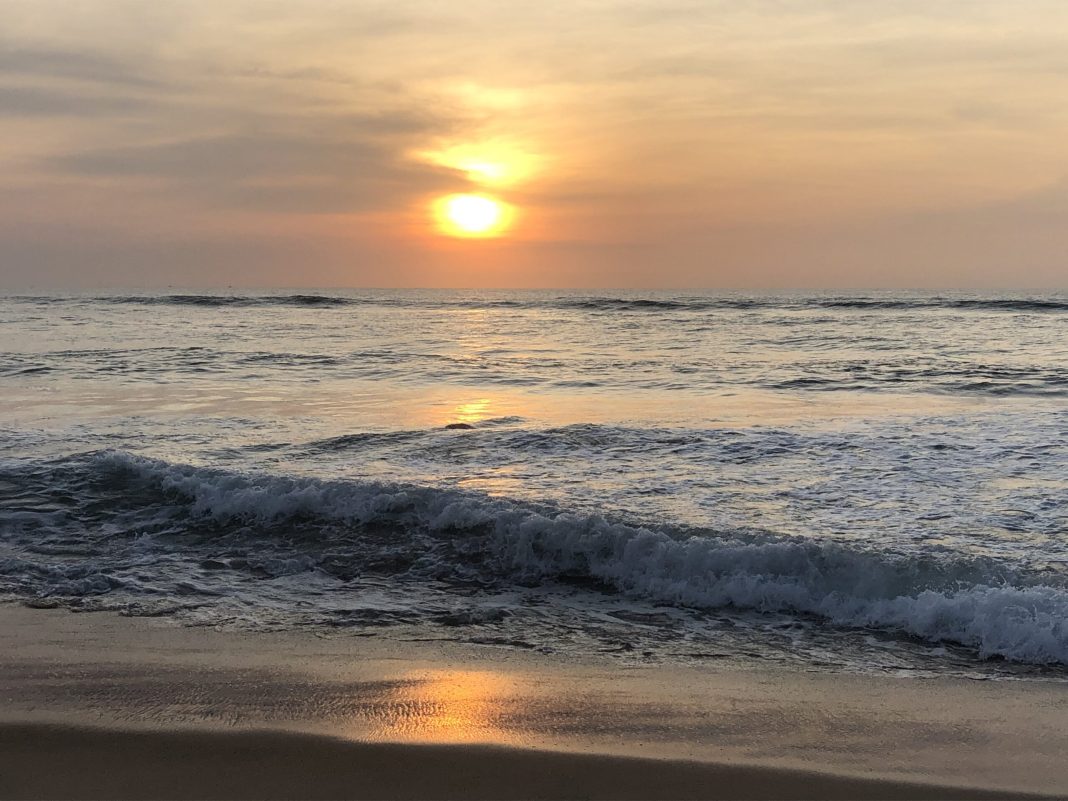- Many small-time hoteliers face closure amid massive job cuts, debts
- Sri Lanka tourism struggles due to lack of foreign visitors
- Top 5 tourist source markets to Sri Lanka hit by the pandemic
- Innovative small timers target new activities to boost cashflow – but hit by second wave
- If pandemic prolongs, revenue may hit lowest since 2012, arrivals 2009
AKKARAIPPATTU, Sri Lanka, (CIR) – A swimming pool built within a short time, a restaurant, a children’s park, and an all-terrain vehicle (ATV) – all have been newly opened after the coronavirus (COVID-19) lockdown in the Sea Sand guest house at Akkaraippattu sea shore.
The aim of Sea Sand’s owner A.M. Nihal is to open his 360-perch property with 10 rooms for local residents to ensure continuous cash flow after the guest house was allowed to open following all necessary health inspection.
Unlike before Covid-19 pandemic, now his occupancy rate of foreign visitors has become zero. His guest house along Pottuvil coastal road is one of the main stop foreign cyclists stay on their way to Eastern tourist hotspot like Argambay and Pasikkudah.
Nihal, a small-time entrepreneur, maintained his seven-member staff, paid salaries from his pocket during the lockdown and now he himself serves food for customers in the restaurant as the food business is picking up following the opening of restaurant on August 1.
SURVIVAL STRATEGY
He charges Rs. 250 per hour for individual for using swimming pool, which is first in Akkaraippattu and Rs. 250 for 200-meter-long four-rounds of ATV ride.
“It was very difficult time in the four months through June as the guest house was just idling in the lockdown. Then we got some guests, specially from the government’s supply agencies as they were distributing essential foods in the East,” Nihal says while sitting near the beach next to his property.
“Now the business is surviving without any foreigners. We have a minimum occupancy rate of 70% because of the customer network we built.”
Foreign visitors chose Sea Sand mainly because they can directly watch the Sun rising while enjoying the sea breeze, the 44-year old Nihal says.
He has built three concrete beds for visitors to enjoy the Sunrise, a unique scene as the Sun rises from the Eastern coast of Sri Lanka.

He has lost some of his usual foreign visitors from Canada, France, and Russia, some of whom stay nearly for more than 40 days in a year.

But Nihal is an outlier in Sri Lanka’s worst hit tourism industry due to COVID-19 lockdown because he has invested his own money unlike many other small-time hoteliers who have borrowed heavily to build their properties.
Tourism industry, Sri Lanka’s highest foreign exchange earner after worker remittances and garment exports, is likely to suffer heavy losses this year because of the pandemic. The industry last year suffered due to the Easter Sunday attack with both revenue and arrivals slowing compared to 2018, the official data showed.
However, this year is unusual for the industry – that nearly accounts for the island nation’s 5% of the $84 billion economy – because of the local leisure sector coming to a standstill after the lockdown.
“Cashflow and lack of revenue stream are the key issues faced by the hoteliers. They are completely helpless,” Srilal Miththapala, former president of The Hotel Association of Sri Lanka and a consultant on the industry, told CIR.
“Some of the government’s good proposals have not filtered down to the sector and retrenchment of employees is obvious.”
Sri Lanka’s leisure sector even suffered during the three-decade war due to frequent suicide attacks by the Tamil Tigers until the state-military annihilated the separatists in 2009.
“In the past, the industry was under our control because still the foreigners were coming to Sri Lanka. But with this pandemic, we have lost the control. All our top source markets like India, UK, and Australia are hit by the covid-19 pandemic,” Miththapala said adding that opening the airport unlikely to attract many tourists “at the moment”.
Some of the small-time hoteliers said they only operate during the weekend and keep the operations shut in the weekdays to minimize expenses.
Some of them speaking to CIR said they have not received any relief measures because they have not registered with the Sri Lanka Tourism Development Authority.

BOOMING INDUSTRY
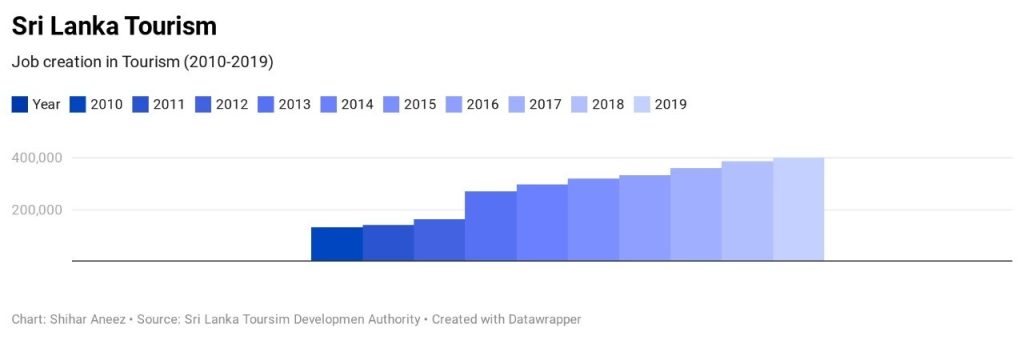
Since the end of the war, the foreign exchange revenue from the tourism has spiked more than 12 times to over $4.3 billion in 2018 when it reached the record high before the Easter Sunday impact. The tourist arrivals also rose nearly six times during the period.
It has been the main employment source of the country since the end of the war. More than 2.8 million direct and indirect jobs have been created by the tourism sector in the 10 years between 2009-2019, the official government data show.
If the pandemic prolongs, Sri Lanka is likely to end up 2020 with the less than $1 billion revenue and just above 500,000 foreign visitors and the country will see its worst performance in revenue since 2012 and the worst arrivals since 2009.
The government under President Gotabaya Rajapaksa had envisaged to boost the revenue to $10 billion with 10 million tourists by 2025. The leisure industry was worst hit by the Easter bombing last year. However, it was recovering rapidly before the lockdown this year.
The arrivals of foreign visitors and the foreign exchange revenue from the tourism are zero since March 28 after the government closed down the country’s main international airport. The revenue so far this year from tourism still remains at the same as the March end’s $956.2 million, the Central Bank data shows.
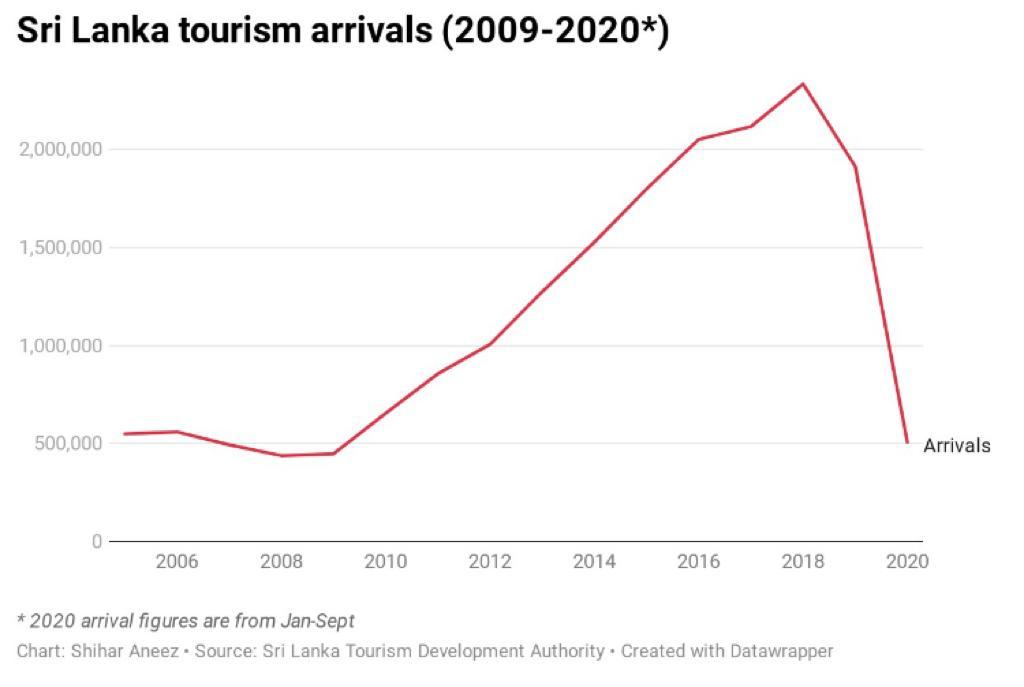
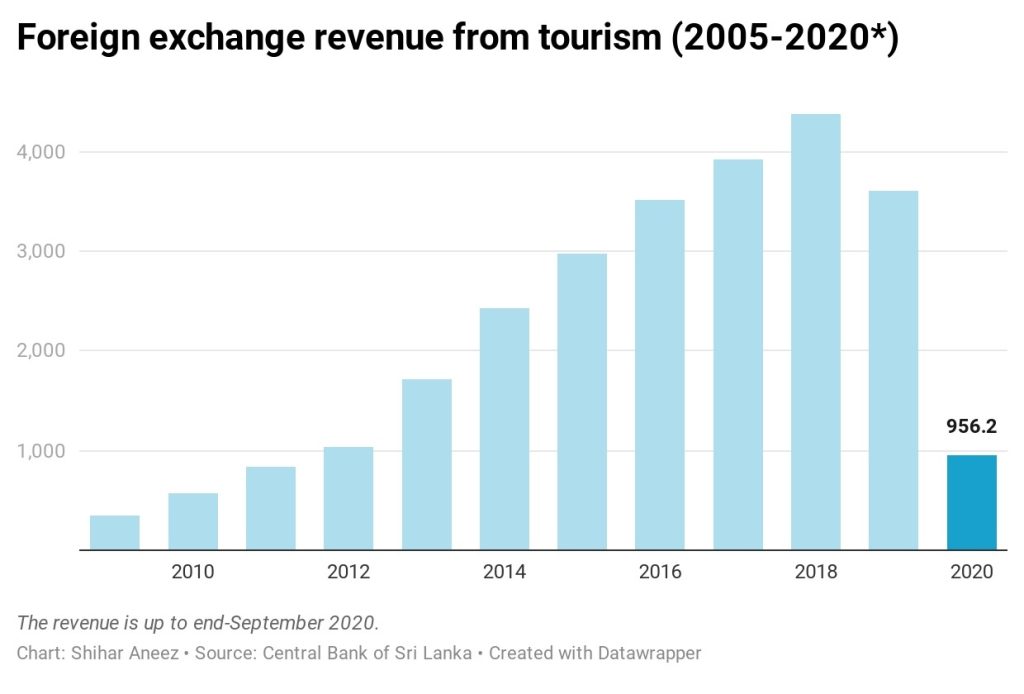
Since the end of the war in 2009, the number of tourist beds have almost doubled through end 2019, number of hotel rooms have risen by 72%, the occupancy rate has been above 70% except for 2009 and 2019, and the tourist receipt per night has more than doubled in the 11 years until end 2019.
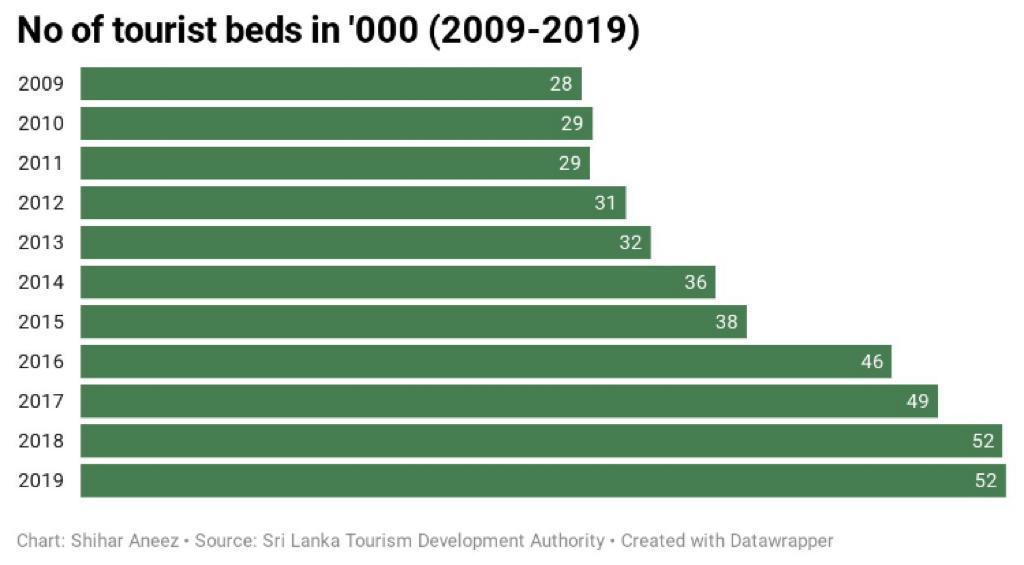



Officials at the ministry of tourism are reluctant to predict the arrival and revenue figures for both this year and the next given the opening of the island nation’s main airport and the ease of covid-19 pandemic situation in other countries are still uncertain.
Kirmali Fernando, Chairperson of Sri Lanka Tourism Development Authority (SLTDA) has said the airport opening at the moment “does not look like within the next one or two months.”
However, she said the “downtime” is used to create more opportunities with the industry is working with health authorities for a tourism app that will help overcome the challenges of quarantine and PCR tests for tourists while the industry is trying to uplift the standards of over 4,950 new sites to be developed as tourist hotspots.
“Eventually when global tourism opens up, Sri Lanka will be one of the top of the list for people to travel,” Fernando told in a televised interview to Tourism Sri Lanka Facebook platform.
The Tourism Ministry Secretary S. Hettiarachchi has told The Sunday Times this week that despite a spike in the detection of COVID-19 positive cases throughout the country, the Tourism Ministry has sought cabinet approval to jump-start the tourism industry by inviting groups of 50 each from Russia and Germany with plans to take them in the Southern Sri Lanka.
MANY HOTELIERS SUFFER
For Gayan Priyadharshana, the owner of Samudhra Beach Hotel in Southern town of Tangalle which is popular for turtle watching and kayak journey, his hotel business has completely paralyzed and some people have stopped working due to failure to pay the salaries.
He borrowed Rs. 12 million from a state bank to increase the rooms of his foreigners-only hotel to eight from five and established a classy garden to attract more foreigners. Before the Covid-19 lockdown, he had repaid Rs. 1.9 million of the loan including interest payment. He has yet to decide to open the hotel for local tourists.
“If things get worse, I may either sell or lease the property,” Priyadharshana told CIR.

“We have no way to get out of this situation. There is no way to repay those debts if foreign tourists do not come. We cannot plan anything in our business until the issue is resolved,” he said.
S.H. Namal Jayawickrema from Kirala Kale Resort in Southern town of Ambalantota says the lockdown came when the business was recovering after a nosedive following the Easter Sunday attack last year.

Jayawickrema has borrowed Rs. 35 million Sri from a state bank to upgrade his 11-room hotel to attract more foreign visitors and had repaid only Rs. 7.3 million before the lockdown.
He has now changed his large restaurant to a hall with a 200-guest capacity to rent out for weddings and meetings including political campaigns with an attractive package.
“Domestic tourist arrivals have dropped by more than 40 percent and costs have risen,” Jayawickrema, said.

Samweera Liyanage of Ruhunu Resorts, Ambalanthota says he has closed his resort to cut down the maintenance cost. He has a lot of Chinese tourists in the last season, but now no one comes.
“We need around Rs. 1.8 million a month to pay the staff. We do not have enough income to pay both employee salaries and bank loans at the moment, so it’s difficult to run the business. We are trying to have a plan in place to attract local tourists to use our hotel somehow,” Liyanage says.
In Kandy, it was a double tragedy for Ramakrishnan Jeyaprakash, the owner of three-star, eight-room Mintaas Hotel in Kandy, famous among tourists for sceneries of Knuckles mountain range, Sri Lanka’s richest biodiversity and a UNESCO natural world heritage.
Jeyaprakash himself was a marketing manager of US-based Cloudbeds, in charge of central Asia, and earning nearly $1,000 monthly in the hotel software business. He has now lost his job as well as his hotel due to the pandemic.
He invested his own saving of Rs. 4.5 million in 2018 to start the hotel and he got continuous revenue through online bookings using www.agoda.com, www.expedia.com, www.airbnb.com, and www.tripadvisor.com until the March lockdown.
The hotel had six employees and Jeyaprakash managed the cashflow by using the profits earned during the peak season to offset the losses in the off season.
“I had to get rid of all my staff with one-month notice and I am unable to manage the 2 million rupee loss in the past six months,” he told CIR.
Eventually Jeyaprakash was forced to cancel the hotel building lease contract last month as he was unable to pay the monthly rent of Rs. 250,000 due to lack of revenue.
Large hotels that were mainly targeting foreigners with more than 500 employees said they have slashed most contractors and some top management employees to manage the cost. They have opened the hotels for wining, dining, and events.
“It is very difficult to survive without foreign tourists,” a senior official of a Colombo based five-star hotel told CIR. “If you are adjusting to cater local tourists, then you need to reduce the quality. But because of our brand name, we cannot reduce the quality below certain standards and we are unable to gain anything.”
Cinnamon’s city hotels have launched “Cinnamon 21” offer promoting a 21% discount on dining venues, banquets and rooms.
“Again we are compelled to depend on local guests,” said a Cinnamon Hotel official asking not to be named. “Even if the airport opens, there will be delays in foreign visitors coming to Sri Lanka given the tight measures on coviod-19 control.”
Some large hotels have offered accommodation in the quarantine process of repatriates, to manage the cost.
SLOW PICKUP, JOB LOSSES
Unlike last year aftermath of Easter Sunday attacks, many small-time tour operators hardly see any local tourists amid fear of COVID-19 spreading. The gradual opening of Sri Lanka’s lockdown still casts some doubts in the minds of Sri Lankans as nobody has the 100% confidence of control of spreading.
“I do not feel safe travelling around the country,” said Niroshan Bandara, a 45-year old father of two, who usually travel out of Colombo at least once a month before the lockdown. “I do not want to see my family facing inconvenience in the name of safety measures at local hotels.”
Many small-time hoteliers CIR spoke to said they are trying to attract more local tourists to manage the cashflow, but the sector is hardly picking up with the concerns of pandemic has yet to ease.
About 60% of the industry is estimated to be in the informal, unregistered small and medium sector and there were about 50,000 businesses providing rooms through booking agencies like Agoda.com, Booking.com and Airbnb.com, according to SLTDA officials.
Sri Lanka recently announced credit and subsidy scheme for Coronavirus hit tourist hotels but the informal sector could not get these benefits.
Tourism industry officials say around half a million employees from the industry have lost their jobs in Sri Lanka due to the impact of the COVID-19 pandemic. The job losses include 180,000 direct employees with the remainder from indirectly related industries.
Many five-star hotels in Colombo have slashed their contracted employees and asked to work on a piece meal basis until they receive foreign visitors.
“I was asked to report to work only when it is necessary,” a cleaner at a 5-star hotel in Colombo told CIR asking not to be named. “They gave me a small amount and asked me to look for some other job until they get foreign tourists.”
In 2019, the industry created a record 402,607 direct and indirect employments despite a hick up in the industry after the Easter Sunday attack, official data showed.
The government has been seriously considering opening the airport at least for foreign visitors from select countries, but it is unlikely until the current wave of the pandemic is controlled.
(Reporting by Shihar Aneez; Additional reporting by Rahul Samantha Hettiarachchi from Hambantota and K.M. Rasool from Kandy. The story is produced by Center for Investigative Reporting (CIR) Sri Lanka [web: https://cir.lk/]; You can contact the reporter via shihar@cir.lk)

